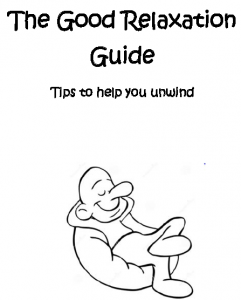
DEALING WITH PHYSICAL TENSION
• Value times of relaxation. Think of them as essentials not extras. Give relaxation some of your best time not just what’s left over.
• Build relaxing things into your lifestyle every day and take your time. Don’t rush. Don’t try too hard.
• Learn a relaxation routine, but don’t expect to learn without practice.
• There are many relaxation routines available, especially on audio tape. These help you to reduce muscle tension and to learn how to use your breathing to help you relax.
• Tension can show in many different ways — aches, stiffness, heart racing, perspiration, stomach churning etc. Don’t be worried about this.
• Keep fit. Physical exercise, such as a regular brisk walk or a swim, can help to relieve tension.
DEALING WITH WORRY
• Accept that worry can be normal and that it can be useful. Some people worry more than others but everyone worries sometimes.
• Write down your concerns. Decide which ones are more important by rating each out of ten.
• Work out a plan of action for each problem.
• Share your worries. Your friends or your general practitioner can give you helpful advice.
• Doing crosswords, reading, taking up a hobby or an interest can all keep your mind active and positive. You can block out worrying thoughts by mentally repeating a comforting phrase.
• Practice enjoying quiet moments, e.g. sitting listening to relaxing music. Allow your mind to wander and try to picture yourself in pleasant, enjoyable situations.
DEALING WITH DIFFICULT SITUATIONS
• Try to build up your confidence. Try not to avoid circumstances where you feel more anxious. A step by step approach is best to help you face things and places which make you feel tense. Regular practice will help you to overcome your anxiety.
• Make a written plan and decide how you are going to deal with difficult situations.
• Reward yourself for your successes. Tell others. We all need encouragement. • Your symptoms may return as you face up to difficult situations. Keep trying and they should become less troublesome as your confidence grows.
• Everyone has good days and bad days. Expect to have more good days as time goes on.
• Remember that expert guidance and advice is available if you need further help.
Patient Information Leaflet produced by the SPPG, Pharmacy and Medicines Management Team. This guide has been adapted from material originally prepared by Dr Colin Espie.
